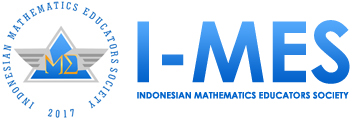Pengaruh Pembelajaran Kooperatif TGT dengan Metode GASING Terhadap Pemahaman Konsep Matematis Perkalian Dua Angka di SD
DOI:
https://doi.org/10.35706/sjme.v8i1.10789Abstract
This research aims to determine the influence of TGT type cooperative learning using the GASING method on students' understanding of the mathematical concept of multiplying two numbers. This research uses quantitative research methods with a quasi-experimental research type and a Nonequivalent Control Group Design research design. The population taken was all elementary schools in South Sumedang District, with the research sample being class IV students at SDN Sukaraja I, totaling 60 students. The research instrument is a test in the form of essay questions regarding understanding the mathematical concept of multiplying two numbers. The validity of the instrument is carried out through expert judgment on several experts and testing the instrument on students who then carry out validity and reliability tests. The data were analyzed by comparing the gain values of the control and experimental classes which had been carried out by normality tests, homogeneity tests and research hypothesis tests. The results of this research show that TGT cooperative learning using the GASING method has an influence on understanding the mathematical concept of multiplying two numbers as evidenced by an increase of 0.56 in the experimental class, higher than the increase in the control class of 0.26.
Downloads
References
Amalia, D. R., Chan, F., & Sholeh, M. (2022). Analisis Kesulitan Siswa Belajar Operasi Hitung Perkalian Pada Pembelajaran Matematika di kelas IV (Vol. 4).
Aprijon. (2020). Pelatihan Matematika Gasing Pada Materi Penjumlahan dan Perkalian Dua Digit Dengan Dua Digit Untuk Siswa kelas VI Sekolah Dasar Negeri. In Jurnal Ilmu Pengetahuan dan Pengembangan Masyarakat Islam p-issn (Vol. 14, Issue 01). http:http://ejournal.uin-suska.ac.id/index.php/Menara/index
Cahyaningsih, U. (2017). Pengaruh Model Pembelajaran Kooperatif Tipe Team Games Tournament (Tgt) Terhadap Hasil Belajar Matematika Siswa Sd. Jurnal Cakrawala Pendas, 3(1).
Diah, R., & Siregar, N. (2023). Pengaruh Model Pembelajaran TGT (Teams Games Tournament) Modifikasi Metode Gasing Terhadap Hasil Belajar Matematika Siswa. EDUKASIA: Jurnal Pendidikan Dan Pembelajaran, 4, 1033–1042. http://jurnaledukasia.org
Diana, P., Marethi, I., & Pamungkas, A. S. (2020). Kemampuan Pemahaman Konsep Matematis Siswa: Ditinjau Dari Kategori Kecemasan Matematik. SJME (Supremum Journal of Mathematics Education), 4(1), 24–32.
Duffin, J. M. , & S. A. P. (2000). A search for understanding. The Journal of Mathematical Behavior, 18, 415–427.
Dwiyono, Y., Kala, H., & Tasik. (2021). Analisis Kesulitan Belajar Operasi Hitung Perkalian Matematika Siswa Kelas Iv Sd Negeri 019 Samarinda Ulu. Jurnal Ilmu Pendidikan LPMP Kalimantan Timur, 48, 175–190.
Ebbutt, S. , & S. A. (1988). Mathematics in Primary Schools Part 1: Children and Mathematics. Collins Educational.
Hidayat, Y. W., & Maharani, A. (2023). Analisis Kondisi Psikologis Siswa Dalam Pembelajaran Matematika Melalui Asesmen Diagnostik. SJME (Supremum Journal of Mathematics Education), 7(2), 169–179. https://doi.org/10.35706/sjme.v7i2.8761
Isrok’atun, & Rosmala, A. (2018). Model-Model Pembelajaran Matematika (B. S. Fatmawati, Ed.). PT. Bumi Aksara.
Julia, J., Subarjah, H., Maulana, M., Sujana, A., Isrokatun, I., Nugraha, D., & Rachmatin, D. (2020). Readiness and competence of new teachers for career as professional teachers in primary schools. European Journal of Educational Research, 9(2), 655–673. https://doi.org/10.12973/eu-jer.9.2.655
Keputusan Kepala BSKAP Kemdekbudristek Nomor 08 Tentang Capaian Pembelajaran Pada Kurikulum Merdeka, (2022).
Khulaifatur, N., Solikin, R., Ayu, D., Cipta, S., Anugraini, A. P., Matematika, P., Budi, I., & Malang, U. (2019). Penggunaan Metode Lattice Dalam Mengatasi Rendahnya Kemampuan Berhitung Operasi Perkalian. In Jurnal Pendidikan dan Riset Matematika (Vol. 2, Issue 1).
Kusuma, W. K., Jampel, N., Wira Bayu, G., Pendidikan Guru, J., Dasar, S., & Pendidikan, J. T. (2018). Pengaruh Metode Pembelajaran Matematika Gasing Terhadap Hasil Belajar Matematika. Jurnal Pedagogi Dan Pembelajaran, 1(1).
Marsigit, Condromukti, R., Setiana, D. S., & Hardiarti, S. (2018). Pengembangan Pembelajaran Matematika Berbasis Etnomatematika. Prosiding Seminar Nasional Etnomatnesia, 20–38.
Nurhayati, Sukenda Egok, A., & Aswarliansyah. (2022). Penerapan Model Pembelajaran Kooperatif Tipe TGT pada Pembelajaran IPA Sekolah Dasar. Jurnal Basicedu, 6(5). https://doi.org/10.31004/basicedu.v6i5.3430
Nursakiah, & Bahar, E. E. (2021). Pelatihan Penerapan Metode Gasing Dalam Operasi. In J. A. I : Jurnal Abdimas Indonesia. https://dmi-journals.org/jai
Prastyo, H. (2020). Kemampuan Matematika Siswa Indonesia Berdasarkan TIMSS. Jurnal Padegogik, 3(2), 111–117. https://doi.org/10.35974/jpd.v3i2.2367
Radiusman, R. (2020). Studi Literasi: Pemahaman Konsep Anak Pada Pembelajaran Matematika. FIBONACCI: Jurnal Pendidikan Matematika Dan Matematika, 6(1), 1. https://doi.org/10.24853/fbc.6.1.1-8
Setianingsih, D., Dian Ayu Afiani, K., Binti Mirnawati Pendidikan Guru Sekolah Dasar, L., & Keguruan dan Ilmu Pendidikan, F. (2021). Penerapan Model Pembelajaran Teams Games Tournament (Tgt) Untuk Meningkatkan Hasil Belajar Materi Perkalian Siswa Kelas Iii Sd Muhammadiyah 8 Surabaya. In ALPEN: Jurnal Pendidikan Dasar (Vol. 5, Issue 1).
Sugiyono. (2013). Metode penelitian pendidikan pendekatan kuantitatif, kualitatif dan R&D.
Y Surya. (2013). Modul Pelatihan Matematika GASING SD Bagian 1. PT. Kandel.
Yanti, A. W., Dwi Putri Kusumawardani, A., Mazidatur Rohmah, F., & Kulsum, U. (2022). Pemahaman Konsep Siswa Dalam Menyelesaikan Masalah Matematika Pada Materi Fungsi Kuadrat Menurut Teori Kilpatrick. MUST: Journal of Mathematics Education, 7(1). https://doi.org/10.30651/must.v7i1.10938
Zulkarnaen, R. (2020). Konsepsi Siswa dalam Proses Pemodelan Matematis. SJME (Supremum Journal of Mathematics Education), 4(2), 178–187.
Downloads
Published
How to Cite
Issue
Section
License

This work is licensed under a Creative Commons Attribution-ShareAlike 4.0 International License.
Authors who publish with this journal agree to the following terms:
- Authors retain copyright and grant the journal right of first publication with the work simultaneously licensed under a Creative Commons Attribution License that allows others to share the work with an acknowledgment of the work's authorship and initial publication in this journal.
- Authors are able to enter into separate, additional contractual arrangements for the non-exclusive distribution of the journal's published version of the work (e.g., post it to an institutional repository or publish it in a book), with an acknowledgment of its initial publication in this journal.
- Authors are permitted and encouraged to post their work online (e.g., in institutional repositories or on their website) prior to and during the submission process, as it can lead to productive exchanges, as well as earlier and greater citation of published work (See The Effect of Open Access).










